Author Archive
Friday, January 23rd, 2009
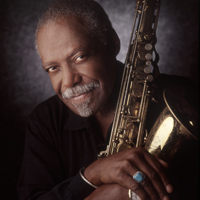 David “Fathead” Newman succumbed to pancreatic cancer. David “Fathead” Newman succumbed to pancreatic cancer.
It is with great sadness that I let you all know that David Newman succumbed to pancreatic cancer on January 20, 2009.
A kind and gentle man, and a heck of a sax player, he will be missed by many.
To view his website, click here.
Posted in Music News | 4 Comments »
Wednesday, January 14th, 2009
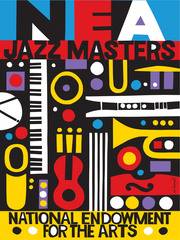 NEA Jazz Masters Moments highlight the jazz greats honored through the NEA Jazz Masters, a comprehensive program of jazz support that includes the NEA Jazz Masters Award, an NEA Jazz Masters tour with performances and educational activities, radio programming, a compilation CD, educational resources, and publications and reports. Nearly 100 radio segments feature eighteen NEA Jazz Masters, providing musical samples, historical information, and first-person anecdotes designed to give listeners added insight into the artists and their art. NEA Jazz Masters Moments highlight the jazz greats honored through the NEA Jazz Masters, a comprehensive program of jazz support that includes the NEA Jazz Masters Award, an NEA Jazz Masters tour with performances and educational activities, radio programming, a compilation CD, educational resources, and publications and reports. Nearly 100 radio segments feature eighteen NEA Jazz Masters, providing musical samples, historical information, and first-person anecdotes designed to give listeners added insight into the artists and their art.
Posted in Music News | 2 Comments »
Wednesday, January 14th, 2009
 WNCU will broadcast the LIVE president-elect Obama’s inauguration speech on Tuesday, January 20, 2009. WNCU will broadcast the LIVE president-elect Obama’s inauguration speech on Tuesday, January 20, 2009.
Posted in Public Affairs | 6 Comments »
Tuesday, January 13th, 2009
By NAT HENTOFF
In 1993, my friend Dizzy Gillespie invited me to join him on one of the jazz cruises where musicians perform and hang out with jazz-struck passengers. I had interviewed him before, but this would be in a more extensive and varied setting. Suddenly Dizzy canceled the trip, entering New Jersey’s Englewood Hospital and Medical Center, where he had previously been a patient. There, dying of pancreatic cancer, Dizzy, who had health insurance, said to Francis Forte, his oncologist, and himself a jazz guitarist: “I can’t give you any money, but I can let you use my name. Promise you’ll help musicians less
fortunate than I am.” That was the Dizzy I knew, regarded by his sidemen as a teacher and mentor.
>From that conversation began the Dizzy Gillespie Memorial Fund and the Dizzy Gillespie Cancer Institute at the hospital. By now more than a thousand jazz musicians unable to pay have received a full range of medical and surgical care by Dr. Forte and a network of more than 50 physicians in various specialties, financed by the hospital and donations.
The primary access to this unprecedented life-expanding jazz program is through the Jazz Foundation of New York, also known internationally for helping jazz musicians — from preventing their being evicted to providing food and other necessities. Since most jazz players don’t have medical or pension plans, some at last have a substantial safety net, all the more extensive thanks to Dizzy.
At Englewood Hospital and Medical Center, the costs of the medical care so far have been more than $5 million. Says Douglas A. Duchak, its president and CEO: “In death, Dizzy’s legacy has touched — and sometimes saved — the lives of jazz musicians around the world.”
Dr. Forte, a guitarist who donates whatever he earns from his jazz gigs at Griffin’s in Cresskill (north of Englewood) to the center, told me recently that eager as he was to fulfill his promise to Dizzy, “I had to first find out if this icon had any skeletons in his closet that could create problems for the hospital. I called a lot of musicians, including trumpet players, and there was nothing, nothing at all, but admiration.”
Thereupon, to summon the spirit of a vintage New Orleans jazz anthem, the saints started marching in. Wendy Oxenhorn, executive director of the Jazz Foundation, says: “They’ve never turned down a musician in need that we have sent them.” She tells of how the Hot & Brass Band of New Orleans, after playing a New York benefit for Hurricane Katrina survivors, came to Englewood Hospital with various ailments, particularly a musician with an untreated gash on his leg from carrying his child through the floodwater. “The doctors at Englewood,” says Wendy, “checked all of them for free, and gave them lunch.”
There are particular physical problems that affect musicians’ livelihoods. “We’ve had people who couldn’t carry their drums — they had degenerative hip disease,” Dr. Forte told the North Jersey Record on Oct. 26. “A fellow with terrible teeth couldn’t play his trumpet, and there are guitarists who can’t play because their wrists hurt.”
I’ve told Frank Forte that he and the other physicians on jazz call at the hospital exemplify a classic Jelly Roll Morton recording, “Doctor Jazz.”
On Oct. 25, in the auditorium of Englewood Hospital and Medical Center, the 15th anniversary of the Dizzy Gillespie Institute and Memorial Fund was celebrated with this Dr. Jazz as honoree. There were 15 musicians performing — some of whom told of the regeneration they’ve received as Dr. Forte’s promise to Dizzy Gillespie is being kept. Pianist Danny Mixon, who has been treated for prostate cancer, said: “I just got cleared from Dr. Forte a few weeks ago. He told me, ‘Just keep playing the music, man.'”
The tribute and concert also marked the grand opening of the new Infusion Therapy Center, serving all of the hospital’s patients in need of the intravenous administration of medication, nutrients or fluids.
Coming, Dr. Forte tells me, are more “screening programs for prostate, colon and breast cancer; diabetes; hypertension; sickle cell anemia, etc. — so people don’t get terribly sick before we see them. I just turned 70, and I am going to continue this as long as I can, hopefully raising some money so we’ll be able to continue doing this in these tough times of cutbacks.”
As a result of the October tribute to him, nearly $25,000 has been donated to the Dizzy Gillespie Memorial Fund in the doctor’s honor. The benefits are not solely to the musicians.
“Heaven knows,” says Dr. Jazz, “the music is a force that brings renewal not only to the sick but also to the staff who treat them. The music spurs on the caregivers and family members, too. We know this for sure at Englewood Hospital.”
These comments are in the liner notes for “Jazz Therapy” — a new series of recordings involving Englewood Hospital, the Jazz Foundation and Motema Records (englewoodhospital.com; jazzfoundation.org and motema.com), with proceeds benefiting the Dizzy Gillespie Memorial Fund.
The concept was proposed to Motema Records founder Jana Harzen, who specializes, she notes, in recording artists who create “music with healing qualities, regardless of genre.” Her label, Motema, is named after a central African word meaning both “heart” and “love.”
The first volume in the Jazz Therapy series, “Smile,” is a lyrically meditative dialogue between guitarists Roni Ben-Hur and Gene Bortoncini. The album is dedicated to the late master bassist Earl May, after whom Englewood Hospital has named the area in the main lobby where jazz musicians perform each weekday from noon to 2 p.m. When “Smile” premiered at Jazz at Lincoln Center in Dizzy’s Club Coca-Cola on Nov. 3, Dr. Jazz, the oncologist, sat in for one number.
As I think of all this healing medicine generated by the spirit of Dizzy Gillespie, he comes to mind as I described him in “Listen to the Stores/ Nat Hentoff on Jazz and Country Music” (Harper Collins): “Seeing Dizzy, however casually, was like coming into sunlight. By the warmth of his greeting, his natural considerateness and the keenness of his intelligence — which made his wit so sharp — he was a delight to be with. And he was a delight to himself when he was alone.”
I was mindful of Gene Lees in “Waiting for Dizzy” (Oxford University Press). About to meet Gillespie in a small park in Minneapolis, he saw that “lost in some musical thought, Dizzy was softly dancing, all alone there, in the sunlight.”
There are musicians now who can dance because of Dizzy and Dr. Jazz.
Mr. Hentoff writes about jazz for the Wall Street Journal.
Posted in Music News | Comments Off on A Heavenly Collaboration: Dizzy Gillespie and Dr. Jazz
Monday, January 12th, 2009
The African American Jazz Caucus, Inc., in partnership with the Schomburg Center for Research in Black Culture of the New York Public Library, will launch Black History month by presenting the 2009 AAJC/HBCU Student All-star Big Band in concert, Sunday, February 1, 2009 at 3:00 pm, in the Schomburg Langston Hughes Auditorium, 135th Street and Malcolm X Boulevard, Harlem, New York. The big band is composed of the finest young talent from outstanding jazz programs at Historically Black Colleges and Universities.
The establishment of the AAJC/HBCU Student All-star Big Band was conceived in 2001 by Dr. Larry Ridley, Executive Director of the African American Jazz Caucus, Inc. They have been performing since 2002 under the direction of the AAJC/HBCU Jazz Directors Committee to standing room only audiences in Long Beach, California; New York City; Toronto, Canada and the Schomburg Center for Research in Black Culture. They were also the featured band in 2006 and 2008 at the University of Notre Dame Collegiate Jazz Festival, the oldest collegiate jazz festival in the world. The Chairman of the Committee is Dr. Russell Thomas, Jackson State University.
The Historically Black Colleges and Universities represented by the 2009 big band members are: Clark Atlanta University; Fayetteville State University; Florida A & M University; Huston – Tillotson University; Jackson State University; North Carolina Central University; Texas Southern University and the University of Maryland Eastern Shore. The big band will be conducted by Professor James Patterson, Clark Atlanta University; Professor James Holden, Virginia State University and Professor Robert Trowers, North Carolina Central University.
Rev. Ronald V. Myers, Sr., M.D., Founder & Chairman of the National Juneteenth Holiday Campaign, will present the prestigious “National Juneteenth Leadership Award” to Ms. Patricia R. Deans, Founder & Director of the Brownsville Heritage House in Brooklyn, NY. Ms. Deans played a key role in the successful passage of the historic legislation in 2004 recognizing “Juneteenth Freedom Day” as an official New York State Holiday Observance.
Please come celebrate Black History Month in Harlem with us!
For more information, please visit www.aajc.us or call (212) 979-0304.
Tickets: members, $16; non members, $20.
For ticket charge call the Schomburg Shop at (212) 491-2206.
Posted in Music News | 8 Comments »
Saturday, January 10th, 2009
Tune in to WNCU 90.7 FM on Monday, January 19, to hear the specials aired in tribute to Martin Luther King, Jr.
 Tune in at 12 Noon Tune in at 12 Noon
Meeting Hate with Love
Stories of King and Ghandi
Produced by David Freudberg
Meeting Hate with Love Stories of King and Gandhi is an exploration on two of the leading figures of non-violence, Martin Luther King and Mahatma Gandhi. Although their stories are well documented, this program provides a unique look with interviews from individuals that knew both men and audio clips from their eras. The program focuses on both men’s non-violent philosophies and is a powerful testament to King and Gandhi’s philosophy.
Tune in at 5pm
The Promised Land
Different Take on the Legacy of MLK
Martin Luther King, Jr. Tribute Mix
Produced by Peter Bochan
A tribute to Martin Luther King Jr, featuring many of his most famous speeches mixed with music from Stevie Wonder, The Freedom Singers, Jimmy Cliff, James Taylor, Nina Simone, Bill Lee/Branford Marsalis, Moodswings,U2 and more

Tune in at 8:30 pm
A Shortcut to the Mountain Top
During a one-hour special, The Promised Land: Different Takes on the Legacy of Martin Luther King, activist, environmentalist, humanitarian Majora Carter gauges the reach of King’s influence. How far have we come? What has been the impact on our kids? On our communities?
You’ll meet a minister who suggests that King’s legacy holds no meaning for today’s children, and a composer whose newly commissioned work “The Homecoming: In Memoriam Martin Luther King” had its premier in September 2008, sung by the San Francisco-based chorus Chanticleer. Paul Mooney, whose pen is behind many of the top African-American comedians, will help sort out how humor fits into discussions of King.
Current voices in civil rights will weigh in on the subject. Author and activist Dr. Vincent Harding recalls his association with Dr. King. Dolores Huerta talks about continuing the efforts begun by César Chávez and what it was like to work and live in his shadow. And you’re introduced to Judy Bonds, a rural white woman fighting mountaintop mining and land desecration in her community. There was a time when she’d never heard of King, yet her battle echoes his in surprising and unexpected ways.
And what’s in a name? What if yours is Martin Luther King? Majora finds out by calling people from the Atlanta phone book.
The Promised Land: Different Takes on the Legacy of Martin Luther King is a special from Launch Minneapolis, winner of the Corporation for Public Broadcasting’s Talent Quest — and a not-to-be-missed hour with Majora Carter. The program is made possible by a grant from the Corporation for Public Broadcasting.
In 2007, Launch was chosen by the Corporation for Public Broadcasting to participate in CPB’s Public Radio Talent Quest, a yearlong initiative to develop new public radio stars.
Host Majora Carter is founder of Sustainable South Bronx (SSBx), a community organization established to advance the environmental and economic rebirth of her hometown. Her honors include the NYU Martin Luther King Jr. Humanitarian Award and the Lewis Rudin Award for Public Service. In 2005, she was awarded the MacArthur “genius” grant. Carter, a sought-after speaker, was named one of Essence magazine’s “25 most influential African-Americans” and one of Newsweek’s “25 to Watch.”
Producer Marge Ostroushko has lent her talents to A Prairie Home Companion, Speaking of Faith, and Mississippi: River of Song, for which she won a Peabody Award. During her 10-year stint at PRI, she oversaw new program development on shows including The Miles Davis Radio Project, Rabbit Ears Radio, Radio Kronos, The Writer’s Almanac, Ben & Jerry’s Newport Folk Festival, and Joseph Campbell and the Power of Myth.
WHAT: The Promised Land: Different Takes on the Legacy of Martin Luther King.
HOST: Environmentalist, humanitarian Majora Carter.
GUESTS: Author and activist Dr. Vincent Harding, United Farm Workers co-founder Dolores Huerta, West Virginia environmentalist Judy Bonds, composer David Conte, and more.
Posted in Public Affairs | 7 Comments »
Tuesday, January 6th, 2009
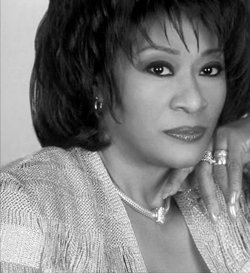 Marlena Shaw was born Marlina Burgess, September 22, 1944, in New Rochelle, New York. Marlena Shaw is among the most versatile and charismatic jazz vocalists on the scene today. Her performances are marked by an artful blend of pop standards and straight-ahead jazz tunes. Her extroverted stage presence gives her an edge over other vocalists, and clearly, singing live before an audience is where she feels most comfortable.After her uncle Jimmy Burgess introduced her to the recordings of Dizzy Gillespie and Miles Davis, she caught the jazz bug and purchased records by Al Hibbler, a vocalist who had a big influence on her singing style. At age ten she performed at Harlem’s Apollo Theater, and despite the enthusiastic reception she received in front of one of the world’s toughest audiences, her mother refused to let her go on the road with her uncle, a trumpet player. Shaw attended the State Teachers’ College in Potsdam, NY, but later dropped out. Marlena Shaw was born Marlina Burgess, September 22, 1944, in New Rochelle, New York. Marlena Shaw is among the most versatile and charismatic jazz vocalists on the scene today. Her performances are marked by an artful blend of pop standards and straight-ahead jazz tunes. Her extroverted stage presence gives her an edge over other vocalists, and clearly, singing live before an audience is where she feels most comfortable.After her uncle Jimmy Burgess introduced her to the recordings of Dizzy Gillespie and Miles Davis, she caught the jazz bug and purchased records by Al Hibbler, a vocalist who had a big influence on her singing style. At age ten she performed at Harlem’s Apollo Theater, and despite the enthusiastic reception she received in front of one of the world’s toughest audiences, her mother refused to let her go on the road with her uncle, a trumpet player. Shaw attended the State Teachers’ College in Potsdam, NY, but later dropped out.
In 1963 she worked around New England with a trio led by Howard McGhee. By the mid-’60s she was performing regularly for audiences in the Catskills, Playboy clubs, and other New York area clubs. In 1966, she recorded “Mercy, Mercy, Mercy” for Cadet Records, and the single sold very well for an unknown singer. The single’s success, a rare vocal version of the tune, prompted executives at Cadet to encourage her to record a whole album for the label in 1967.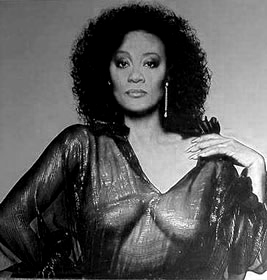 The diversity of styles, including blues, jazz, and pop standards, is reflected in the album’s title, Out of Different Bags. Through her accountant, she was brought to the attention of band leader Count Basie, and she ended up singing with the Basie band for four years. The diversity of styles, including blues, jazz, and pop standards, is reflected in the album’s title, Out of Different Bags. Through her accountant, she was brought to the attention of band leader Count Basie, and she ended up singing with the Basie band for four years.
In 1972, after leaving the Basie Orchestra, Shaw was the first female vocalist signed to Blue Note Records, and she toured for a while with the late Sammy Davis Jr. Shaw recorded five albums and several singles for Blue Note, and critics likened her singing style to Dinah Washington and Sarah Vaughan. At her club shows, Shaw dazzled audiences with her intoxicating blend of straight-ahead jazz, soul, pop, and classic R&B, but her recordings will also satisfy fans of traditional jazz who have no prejudices about blues and R&B. ~ Richard Skelly, All Music Guide
Posted in Artist of the Month | 4 Comments »
Tuesday, December 30th, 2008
By Peter Keepnews
Freddie Hubbard, a jazz trumpeter who dazzled audiences and critics alike with his virtuosity, his melodicism and his infectious energy, died Monday in Sherman Oaks, California. He was 70.
The cause was complications of a heart attack he had Nov. 26, said his spokesman, Don Lucoff of DL Media.
Over a career that began in the late 1950s, Hubbard earned both critical praise and commercial success – although rarely for the same projects.
He attracted attention in the 1960s for his bravura work as a member of the Jazz Messengers, the valuable training ground for young musicians led by the veteran drummer Art Blakey, and on albums by Herbie Hancock, Wayne Shorter and many others. He also recorded several well-regarded albums as a leader. And although he was not an avant-gardist by temperament, he participated in three of the seminal recordings of the 1960s jazz avant-garde: Ornette Coleman’s “Free Jazz” (1960), Eric Dolphy’s “Out to Lunch” (1964) and John Coltrane’s “Ascension” (1965).
In the 1970s Hubbard, like many other jazz musicians of his generation, began courting a larger audience, with albums that featured electric instruments, rock and funk rhythms, string arrangements and repertory sprinkled with pop and R&B songs like Paul McCartney’s “Uncle Albert/Admiral Halsey” and the Stylistics’ “Betcha by Golly, Wow.” His audience did indeed grow, but his standing in the jazz world diminished.
By the start of the next decade he had largely abandoned his more commercial approach and returned to his jazz roots. But his career came to a virtual halt in 1992 when he damaged his lip, and although he resumed performing and recording after an extended hiatus, he was never again as powerful a player as he had been in his prime.
Frederick Dewayne Hubbard was born on April 7, 1938, in Indianapolis. His first instrument was the alto-brass mellophone, and in high school he studied French horn and tuba as well as trumpet.
After taking lessons with Max Woodbury, the first trumpeter of the Indianapolis Symphony Orchestra, at the Arthur Jordan Conservatory of Music, he performed locally with, among others, the guitarist Wes Montgomery and his brothers.
Hubbard moved to New York in 1958 and almost immediately began working with groups led by the saxophonist Sonny Rollins, the drummer Philly Joe Jones and others. His profile rose in 1960 when he joined the roster of Blue Note, a leading jazz label; it rose further the next year when he was hired by Blakey, widely regarded as the music’s premier talent scout.
Adding his own spin to a style informed by Dizzy Gillespie, Miles Davis and Clifford Brown, Hubbard played trumpet with an unusual mix of melodic inventiveness and technical razzle-dazzle. The critics took notice. Leonard Feather called him “one of the most skilled, original and forceful trumpeters of the ’60s.”
After leaving Blakey’s band in 1964, Hubbard worked for a while with another drummer-bandleader, Max Roach, before forming his own group in 1966. Four years later he began recording for CTI, a record company that would soon become known for its aggressive efforts to market jazz musicians beyond the confines of the jazz audience.
Hubbard won a Grammy Award for the album “First Light” in 1972 and was named a National Endowment for the Arts Jazz Master in 2006.
He is survived by his wife of 35 years, Briggie Hubbard, and his son, Duane.
Hubbard was once known as the brashest of jazzmen, but his personality as well as his music mellowed in the wake of his lip problems. In a 1995 interview with Fred Shuster of Down Beat, Hubbard offered some sober advice to younger musicians: “Don’t make the mistake I made of not taking care of myself. Please, keep your chops cool and don’t overblow.”
Click here to view obituary.
Click here to view bio.
Click here to view discography.
Check out a couple YouTube clips below:
http://www.youtube.com/watch?v=4noNAphDFA8&feature=related
http://www.youtube.com/watch?v=xYAVaAiURqU
http://www.youtube.com/watch?v=kTbsxtUJZN0&feature=related
Posted in Music News | 6 Comments »
Sunday, December 21st, 2008
The New York Times
My Alerts: NY Times Jazz
December 19, 2008 1:43 AM
——————————
Arts: G.M. Pulls Out of Jazz Festival
By BEN SISARIO; Compiled by Dave Itzkoff
General Motors will withdraw as the lead sponsor of the Montreal International Jazz Festival, one of the biggest and most prestigious in the world, because of the crisis in the auto industry. G.M. has contributed about 10 percent of the festival’s $25 million annual budget but will not renew its current five-year sponsorship contract, which expires after the 30th-anniversary season next summer, said Alain Simard, president of the festival’s parent company, L’Équipe Spectra. “We have a year and a half to find a new lead sponsor,” Mr. Simard said. “It’s not easy in these times, but in 30 years we have never been without a sponsor.” With more than 500 concerts, about two-thirds of them free, the festival regularly attracts more than a million visitors to the city. The lineup for next summer includes Buddy Guy, Chucho Valdés, Madeleine Peyroux, Patricia Barber, Dave Holland and Gonzalo Rubalcaba.
Full Story:
http://www.nytimes.com/2008/12/19/arts/19arts-GMPULLSOUTOF_BRF.html?emc=tnt&tntemail1=y
Posted in Music News | 5 Comments »
Monday, December 1st, 2008
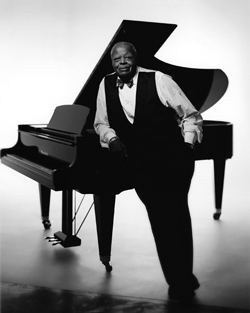 Oscar Peterson was a Canadian jazz pianist and composer. He was called the “Maharaja of the keyboard” by Duke Ellington, “O.P.” by his friends, and was a member of jazz royalty. He released over 200 recordings, won seven Grammy Awards, and received other numerous awards and honors over the course of his career. He is considered to have been one of the greatest pianists of all time, who played thousands of live concerts to audiences worldwide in a career lasting more than 65 years. Oscar Peterson has entertained the world with his mastery and prowess over the piano for over 40 years. Born in a limestone house on Montreal’s Delisle Street on August 15, 1925, he was the fourth of five children to his parents, Daniel and Kathleen. All of the Peterson children (Fred, Daisy, Charles, Oscar and May) were introduced to music in a good way before any of them can remember. Their father, a porter with Canadian Pacific Railways who learned to play piano on his own while in the merchant marine, taught his children all he could until they achieved a certain proficiency. It was at this point, during his high school years, that Oscar came to study with an accomplished classical pianist, Hungarian Paul de Marky, who taught Oscar “technique and speedy fingers.” He also helped Oscar come to believe that he had something special to give to the music world. Oscar Peterson was a Canadian jazz pianist and composer. He was called the “Maharaja of the keyboard” by Duke Ellington, “O.P.” by his friends, and was a member of jazz royalty. He released over 200 recordings, won seven Grammy Awards, and received other numerous awards and honors over the course of his career. He is considered to have been one of the greatest pianists of all time, who played thousands of live concerts to audiences worldwide in a career lasting more than 65 years. Oscar Peterson has entertained the world with his mastery and prowess over the piano for over 40 years. Born in a limestone house on Montreal’s Delisle Street on August 15, 1925, he was the fourth of five children to his parents, Daniel and Kathleen. All of the Peterson children (Fred, Daisy, Charles, Oscar and May) were introduced to music in a good way before any of them can remember. Their father, a porter with Canadian Pacific Railways who learned to play piano on his own while in the merchant marine, taught his children all he could until they achieved a certain proficiency. It was at this point, during his high school years, that Oscar came to study with an accomplished classical pianist, Hungarian Paul de Marky, who taught Oscar “technique and speedy fingers.” He also helped Oscar come to believe that he had something special to give to the music world.
As a child, Peterson also studied with Hungarian-born pianist Paul de Marky, a student of Istvan Thomán who was himself a pupil of Franz Liszt, so his training was predominantly based on classical piano. Meanwhile, he was captivated by traditional jazz and learned several ragtimes and especially the boogie-woogie. At that time Peterson was called “the Brown Bomber of the Boogie-Woogie.” At age nine Peterson played piano with control that impressed professional musicians. For many years his piano studies included four to six hours of practice daily. Only in his later years did he decrease his daily practice to just one or two hours. In 1940, at age fourteen, Peterson won the national music competition organized by the Canadian Broadcasting Corporation. After that victory, he dropped out of school and became a professional pianist working for a weekly radio show, and playing at hotels and music halls. In his last years of high school, Oscar played in a band called the Montreal High School Victory Serenaders with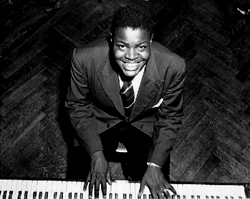 trumpeter Maynard Ferguson. He got permission to play the baby grand piano during the lunch hours and in his words this was “the best way to have a bunch of girls come down. I became the guy.” At 14 years of age, Oscar’s older sister Daisy got him to audition for a CBC (Canadian Broadcasting Corporation) national amateur contest which he went on to win. This opened the doors to performances on a weekly broadcast show, on a Montreal radio station, called Fifteen Minutes’ Piano Rambling and later performances on a national CBC broadcast called The Happy Gang. Finally, when algebra couldn’t banish musical arrangements, Oscar asked to drop out of high school. His father told him that he couldn’t “let him leave high school to be a jazz piano player. You have to be the best, there is no second best.” trumpeter Maynard Ferguson. He got permission to play the baby grand piano during the lunch hours and in his words this was “the best way to have a bunch of girls come down. I became the guy.” At 14 years of age, Oscar’s older sister Daisy got him to audition for a CBC (Canadian Broadcasting Corporation) national amateur contest which he went on to win. This opened the doors to performances on a weekly broadcast show, on a Montreal radio station, called Fifteen Minutes’ Piano Rambling and later performances on a national CBC broadcast called The Happy Gang. Finally, when algebra couldn’t banish musical arrangements, Oscar asked to drop out of high school. His father told him that he couldn’t “let him leave high school to be a jazz piano player. You have to be the best, there is no second best.”
Some of the artists who influenced Oscar during the early years were Teddy Williams, Nat (King) Cole, James P. Johnson and the legendary Art Tatum, who many have tried to compare Oscar to in later years. In fact, one of Oscar’s first exposures to the musical talents of Art Tatum came early in his teen years when his father played an Art Tatum record to him and Oscar was so intimidated by what he heard that he didn’t touch the piano for over a month.
According to pianist/educator Mark Eisenman, some of Peterson’s best playing was as an understated accompanist to singer Ella Fitzgerald and trumpeter Roy Eldridge. Peterson wrote pieces for piano, for trio, for quartet and for big band. He also wrote several songs, and made recordings as a singer. Probably his best-known compositions are “Canadiana Suite” and “Hymn to Freedom,” the latter composed in the 1960s and inspired by the U.S. civil rights movement. Peterson taught piano and improvisation in Canada, mainly in Toronto. With associates, he started and headed the Advanced School of Contemporary Music in Toronto for five years during the 1960s, but it closed because concert touring called him and his associates away, and it did not have government funding. Later, he mentored the York University jazz program and was the Chancellor of the entire university for several years in the early 1990s. He also published his original jazz piano etudes for practice. However, he asked his students to study the music of Johann Sebastian Bach, especially the Well Tempered Clavier, the Goldberg Variations, and the The Art of Fugue, considering these piano pieces essential for every serious pianist. Pianists Benny Green and Oliver Jones were among his students.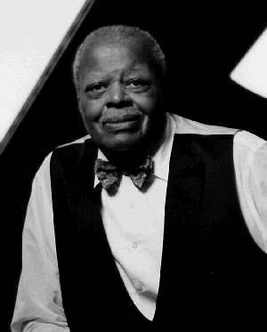
After the stroke, Peterson recuperated for about two years. He gradually regained mobility and some control of his left hand. However, his virtuosity was never restored to the original level, and his playing after his stroke relied principally on his right hand. In 1995 he returned to public performances on a limited basis, and also made several live and studio recordings for Telarc. In 1997 he received a Grammy for Lifetime Achievement and an International Jazz Hall of Fame Award, another indication that Peterson continued to be regarded as one of the greatest jazz musicians ever to play. Canadian politician, friend, and amateur pianist Bob Rae contends that “a one-handed Oscar was better than just about anyone with two hands”. On 23 December 2007, Peterson died of renal failure at his home in Mississauga, Ontario. He left seven children, his fourth wife Kelly, and their daughter, Celine (born 1991).His work earned him seven Grammy awards over the years and he was elected to the Canadian Music Hall of Fame in 1978. He also belongs to the Juno Awards Hall of Fame and the Canadian Jazz and Blues Hall of Fame.
Posted in Artist of the Month | 11 Comments »
|
 David “Fathead” Newman succumbed to pancreatic cancer.
David “Fathead” Newman succumbed to pancreatic cancer.

 NEA Jazz Masters Moments highlight the jazz greats honored through the NEA Jazz Masters, a comprehensive program of jazz support that includes the NEA Jazz Masters Award, an NEA Jazz Masters tour with performances and educational activities, radio programming, a compilation CD, educational resources, and publications and reports. Nearly 100 radio segments feature eighteen NEA Jazz Masters, providing musical samples, historical information, and first-person anecdotes designed to give listeners added insight into the artists and their art.
NEA Jazz Masters Moments highlight the jazz greats honored through the NEA Jazz Masters, a comprehensive program of jazz support that includes the NEA Jazz Masters Award, an NEA Jazz Masters tour with performances and educational activities, radio programming, a compilation CD, educational resources, and publications and reports. Nearly 100 radio segments feature eighteen NEA Jazz Masters, providing musical samples, historical information, and first-person anecdotes designed to give listeners added insight into the artists and their art. WNCU will broadcast the LIVE president-elect Obama’s inauguration speech on Tuesday, January 20, 2009.
WNCU will broadcast the LIVE president-elect Obama’s inauguration speech on Tuesday, January 20, 2009. Tune in at 12 Noon
Tune in at 12 Noon
 Marlena Shaw was born Marlina Burgess, September 22, 1944, in New Rochelle, New York. Marlena Shaw is among the most versatile and charismatic jazz vocalists on the scene today. Her performances are marked by an artful blend of pop standards and straight-ahead jazz tunes. Her extroverted stage presence gives her an edge over other vocalists, and clearly, singing live before an audience is where she feels most comfortable.After her uncle Jimmy Burgess introduced her to the recordings of Dizzy Gillespie and Miles Davis, she caught the jazz bug and purchased records by Al Hibbler, a vocalist who had a big influence on her singing style. At age ten she performed at Harlem’s Apollo Theater, and despite the enthusiastic reception she received in front of one of the world’s toughest audiences, her mother refused to let her go on the road with her uncle, a trumpet player. Shaw attended the State Teachers’ College in Potsdam, NY, but later dropped out.
Marlena Shaw was born Marlina Burgess, September 22, 1944, in New Rochelle, New York. Marlena Shaw is among the most versatile and charismatic jazz vocalists on the scene today. Her performances are marked by an artful blend of pop standards and straight-ahead jazz tunes. Her extroverted stage presence gives her an edge over other vocalists, and clearly, singing live before an audience is where she feels most comfortable.After her uncle Jimmy Burgess introduced her to the recordings of Dizzy Gillespie and Miles Davis, she caught the jazz bug and purchased records by Al Hibbler, a vocalist who had a big influence on her singing style. At age ten she performed at Harlem’s Apollo Theater, and despite the enthusiastic reception she received in front of one of the world’s toughest audiences, her mother refused to let her go on the road with her uncle, a trumpet player. Shaw attended the State Teachers’ College in Potsdam, NY, but later dropped out. The diversity of styles, including blues, jazz, and pop standards, is reflected in the album’s title, Out of Different Bags. Through her accountant, she was brought to the attention of band leader Count Basie, and she ended up singing with the Basie band for four years.
The diversity of styles, including blues, jazz, and pop standards, is reflected in the album’s title, Out of Different Bags. Through her accountant, she was brought to the attention of band leader Count Basie, and she ended up singing with the Basie band for four years. Oscar Peterson was a Canadian jazz pianist and composer. He was called the “Maharaja of the keyboard” by Duke Ellington, “O.P.” by his friends, and was a member of jazz royalty. He released over 200 recordings, won seven Grammy Awards, and received other numerous awards and honors over the course of his career. He is considered to have been one of the greatest pianists of all time, who played thousands of live concerts to audiences worldwide in a career lasting more than 65 years. Oscar Peterson has entertained the world with his mastery and prowess over the piano for over 40 years. Born in a limestone house on Montreal’s Delisle Street on August 15, 1925, he was the fourth of five children to his parents, Daniel and Kathleen. All of the Peterson children (Fred, Daisy, Charles, Oscar and May) were introduced to music in a good way before any of them can remember. Their father, a porter with Canadian Pacific Railways who learned to play piano on his own while in the merchant marine, taught his children all he could until they achieved a certain proficiency. It was at this point, during his high school years, that Oscar came to study with an accomplished classical pianist, Hungarian Paul de Marky, who taught Oscar “technique and speedy fingers.” He also helped Oscar come to believe that he had something special to give to the music world.
Oscar Peterson was a Canadian jazz pianist and composer. He was called the “Maharaja of the keyboard” by Duke Ellington, “O.P.” by his friends, and was a member of jazz royalty. He released over 200 recordings, won seven Grammy Awards, and received other numerous awards and honors over the course of his career. He is considered to have been one of the greatest pianists of all time, who played thousands of live concerts to audiences worldwide in a career lasting more than 65 years. Oscar Peterson has entertained the world with his mastery and prowess over the piano for over 40 years. Born in a limestone house on Montreal’s Delisle Street on August 15, 1925, he was the fourth of five children to his parents, Daniel and Kathleen. All of the Peterson children (Fred, Daisy, Charles, Oscar and May) were introduced to music in a good way before any of them can remember. Their father, a porter with Canadian Pacific Railways who learned to play piano on his own while in the merchant marine, taught his children all he could until they achieved a certain proficiency. It was at this point, during his high school years, that Oscar came to study with an accomplished classical pianist, Hungarian Paul de Marky, who taught Oscar “technique and speedy fingers.” He also helped Oscar come to believe that he had something special to give to the music world. trumpeter Maynard Ferguson. He got permission to play the baby grand piano during the lunch hours and in his words this was “the best way to have a bunch of girls come down. I became the guy.” At 14 years of age, Oscar’s older sister Daisy got him to audition for a CBC (Canadian Broadcasting Corporation) national amateur contest which he went on to win. This opened the doors to performances on a weekly broadcast show, on a Montreal radio station, called Fifteen Minutes’ Piano Rambling and later performances on a national CBC broadcast called The Happy Gang. Finally, when algebra couldn’t banish musical arrangements, Oscar asked to drop out of high school. His father told him that he couldn’t “let him leave high school to be a jazz piano player. You have to be the best, there is no second best.”
trumpeter Maynard Ferguson. He got permission to play the baby grand piano during the lunch hours and in his words this was “the best way to have a bunch of girls come down. I became the guy.” At 14 years of age, Oscar’s older sister Daisy got him to audition for a CBC (Canadian Broadcasting Corporation) national amateur contest which he went on to win. This opened the doors to performances on a weekly broadcast show, on a Montreal radio station, called Fifteen Minutes’ Piano Rambling and later performances on a national CBC broadcast called The Happy Gang. Finally, when algebra couldn’t banish musical arrangements, Oscar asked to drop out of high school. His father told him that he couldn’t “let him leave high school to be a jazz piano player. You have to be the best, there is no second best.”
